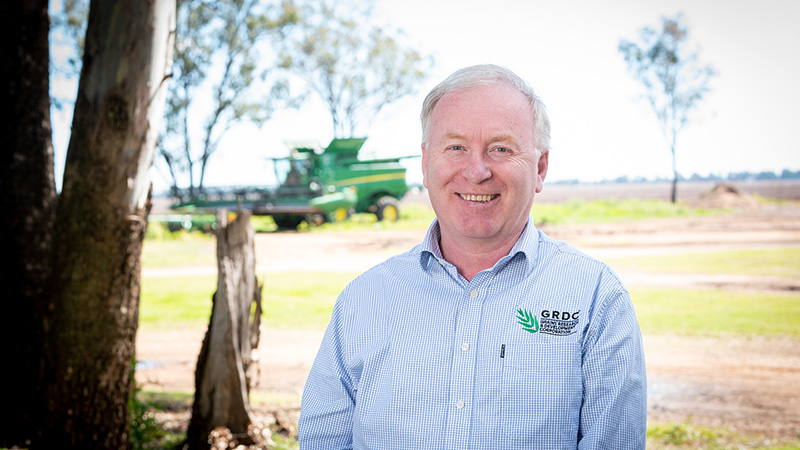Australian growers will benefit from a renewed focus on grains research, development and extension (RD&E) data and insights with the announcement of a five-year strategic partnership aimed at harnessing analytics to drive the sector’s profitability and global competitiveness.
Analytics for the Australian Grains Industry (AAGI) is a co-investment from the Grains Research and Development Corporation (GRDC) with strategic partners Curtin University, The University of Queensland (UQ) and University of Adelaide.
GRDC managing director Nigel Hart says AAGI would work to unleash the potential of statistics, machine learning, data fusion and analytics for Australian grain growers, aiming for the “unconstrained adoption of analytics-driven decision-making”.

GRDC managing director Nigel Hart said AAGI would bring together leading Australian and international universities, federal and state government research agencies, and commercial technology and analytics providers as one team to tackle the grains industry’s biggest challenges. Photo: GRDC
“Our RD&E projects require a rigorous, data-driven approach, so statistical and analytical capabilities are critical for converting raw data into meaningful knowledge for grain growers and the broader grains industry,” Mr Hart says.
“As such GRDC is committing $36 million over five years to AAGI, which complements a $56 million co-investment from the initiative’s three strategic partners at Curtin University, The University of Queensland and the University of Adelaide.
“This investment will support Australian grain growers to be world leaders in analytics-driven decision making, which will drive efficiency and precision and support farm enterprise risk management.”
Over a decade ago, GRDC identified the value of investment in statistics for the Australian grains industry and AAGI will be a significant step change in that approach.
This new research will build on the foundational work done under the GRDC’s $23.8 million Statistics for the Australian Grains Industry 3 (SAGI3) investment, which delivered vital information for the grains sector between 2016 and 2023. During this period SAGI3 provided statistical expertise to more than 210 GRDC investments totalling more than $490 million.
As a result of these investments, growers now benefit from better germplasm selections in pre-breeding programs, clearer research-driven agronomic recommendations, and tools that use data to support on-farm decision-making.
Curtin University Vice-Chancellor Professor Harlene Hayne says Curtin is proud to be involved in this new globally significant partnership that will directly address challenges and opportunities associated with a data driven future for agriculture.
“AAGI will involve researchers from our Centre for Crop and Disease Management, as well as other Curtin research groups who are already well known for their expertise in industry engagement, biometry, sampling and experimental design, bioinformatics, spatial modelling and machine learning, computer vision and artificial intelligence, econometrics, optimisation and more,” Professor Hayne says.
“This strategic partnership in data science aligns with Curtin’s goal to provide leadership and capability for a profitable and sustainable agriculture industry, and I look forward to seeing Australian grain producers thrive as a result.”
UQ Vice Chancellor, Professor Deborah Terry AO, says the partnership will build frontier research solutions for all levels of the grains industry while helping to expand analytics training and support for the agriculture community.
“This is an excellent demonstration of how collaboration between industry and the higher education community can deliver outstanding outcomes for those working across Australia in one of our most important export industries,” Professor Terry says.
“One of the real legacies of the AAGI initiative will be developing the capability of a new generation of talented analytics graduates to support the grains industry for many years to come.”
Professor Peter Høj AC, Vice-Chancellor and President, University of Adelaide, says that as a global leader in research and development, the University of Adelaide welcomed the opportunity to work collectively with its partners to deliver high-quality, leading-edge data analytics capability for the Australian grains industry.
“The University of Adelaide has assembled a strong cohort of well-established industry driven analytics research teams for AAGI, with expertise across biometry, data science, mathematics, machine learning and artificial intelligence,” Professor Høj says.
“Collaboratively with our partners, these teams will drive analytical innovation and ensure accelerated productivity, profitability and future sustainability for Australian grain growers.”
AAGI will be led by Dr Nathan O’Callaghan, who commences today (August 28) as AAGI’s inaugural Director.
Formerly Director of the Precision Health Future Science Platform at CSIRO, Dr O’Callaghan is a highly respected Australian science and innovation leader.
“Dr O’Callaghan brings a wealth of experience to the role of AAGI Director, through his extensive work at CSIRO and across government, academia and industry,” Mr Hart says.
“Working closely with strategic partners, Dr O’Callaghan will lead AAGI in bringing together universities, federal and state government research agencies, and commercial technology and analytics providers as one team to tackle the grains industry’s biggest challenges.”
AAGI will build substantial capacity in the grains RD&E analytics workforce, with investment earmarked to support the equivalent of 49 full-time researchers and 48 higher degree research students.
This increased capacity will broaden analytics capabilities, allow for more investment into high-priority research, and attract additional intellectual property, investment and expertise from the commercial sector and other parties.

























































